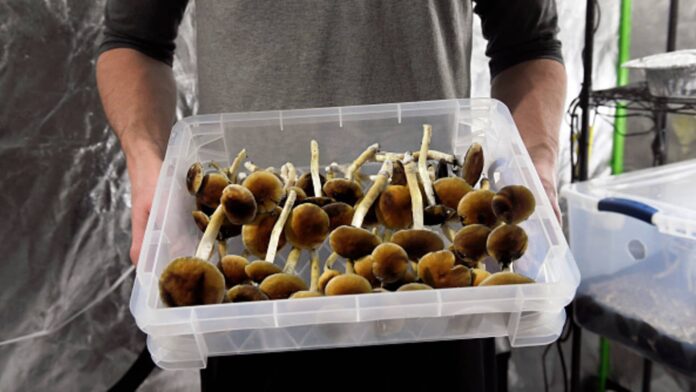Voters in Colorado approved a ballot measure legalizing the use of psilocybin and psilocin, two psychedelic compounds found in so-called magic mushrooms, in Tuesday’s midterm election, becoming the second state to do so in two years.
The measure narrowly passed, the AP projected, with 52% of the more than 2.2 million votes cast supporting legalization, with 93% of the expected vote counted as of Friday.
The initiative allows for the use of psilocybin at state-regulated centers under the supervision of licensed facilitators. It also legalizes personal private use, growing and sharing of psilocybin and psilocin, as well as three additional psychedelic compounds — DMT, ibogaine and mescaline — by adults over the age of 21. Retail sales are not permitted, and the law has several limitations, including ones prohibiting use in public, in school, or while operating a vehicle.
“I’m in awe of what we were able to accomplish,” said Veronica Lightning Horse Perez, one of the lead proponents behind the legalization effort. “Over a million people voted yes on this. To think that many people see the value in these medicines, that many people know that these can be used for healing — that’s huge.”
Psilocybin is illegal at the federal level and in most states, though it is decriminalized in Washington, D.C., and more than a dozen other cities. But a growing body of research has found therapeutic, anti-anxiety uses for the chemical, prompting some states to consider relaxing restrictions.
Voters in Oregon passed a measure legalizing magic mushrooms for therapeutic use in 2020, and lawmakers in Washington and New York have proposed legalization bills this year.
Bills that would decriminalize possession have been introduced in 19 states — including Missouri, Iowa and Kansas — though none have been enacted. And more than a dozen states — including Florida, Oklahoma and Texas — have introduced legislation to further study the health benefits of psilocybin.
“More folks are starting to recognize and understand, when it comes to psychedelic therapy, this is not some sort of radical field. It’s becoming more mainstream,” said Oklahoma state Rep. Daniel Pae, who co-authored a bill that would authorize scientific research into psilocybin.
The bill, which passed in the Oklahoma House and is headed to the state Senate for consideration, would allow adults living with a handful of conditions to participate in state-run clinical trials using psilocybin. Texas passed a similar bill last year.
The potential of psychedelics to be a part of treatments for depression, anxiety, post-traumatic stress disorder, drug dependency and eating disorders is being evaluated in numerous clinical trials. In 2018, the Food and Drug Administration marked psilocybin as a “breakthrough therapy,” a designation that expedites the development of drugs that may be more effective than existing treatments.
Hawaii’s state Senate cited the FDA designation in March when it approved a bill that would assemble a task force to develop a long-term plan to make psilocybin available to adults over the age of 21 seeking mental health treatment. Connecticut lawmakers convened a group to study psilocybin last year and adjusted its state budget to fund therapy programs administering psychedelic treatments to veterans and retired first responders.
While more than 60 bills have been introduced around the country, the majority, including the Hawaii bill, are stalled in committee or have failed to get a vote. In Washington, legislators opted to study the substance after struggling to loosen restrictions. And in California, lawmakers transformed a bill to decriminalize use into one that would analyze policy.
In Colorado, the ballot measure’s victory marks the state’s second time making psychedelic history in three years. Denver became the first U.S. city to decriminalize psilocybin in 2019.
For Kevin Franciotti, a Denver-based addiction counselor who received psychedelic treatment for an opioid use disorder more than a decade ago, this is Colorado’s “opportunity to be a leader in pushing American drug policy in the right direction.”
Not everyone is on board with legalizing psychedelics. Some opponents of the Colorado measure say it would promote using these substances before the FDA says they are safe.
“I’m hoping the rest of the country can learn the hard lessons from my state’s foray,” said Luke Niforatos, who leads two national organizations that opposed the drug legalization measure. “As the years go on and we learn more about this experiment, hopefully we’ll say we’re going to let the FDA and scientists lead medicine, not corporations.”


